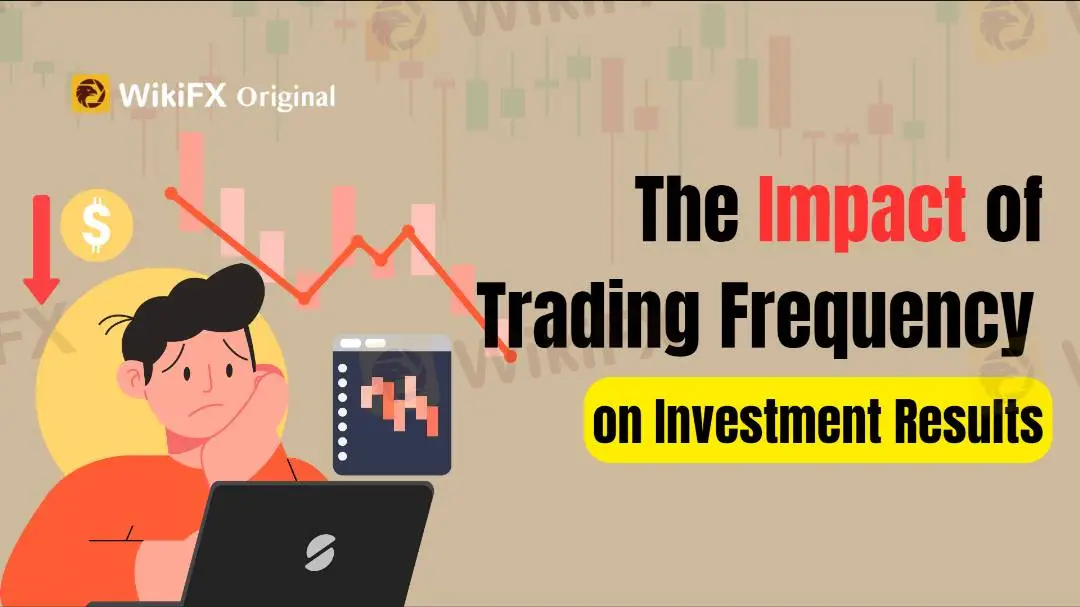简体中文
繁體中文
English
Pусский
日本語
ภาษาไทย
Tiếng Việt
Bahasa Indonesia
Español
हिन्दी
Filippiiniläinen
Français
Deutsch
Português
Türkçe
한국어
العربية
The Impact of Trading Frequency on Investment Results
Abstract:Many individuals who incur losses share a common trait. They often either trade excessively or too infrequently because they fear trading at a loss.
Many individuals who incur losses share a common trait. They often either trade excessively or too infrequently because they fear trading at a loss.

Trading excessively
Excessive trading is one of the major factors leading to losses. In any 12-month market cycle, there are typically 4 to 6 months with clear trends. This means that any fluctuations during those periods are predictable and rational, allowing for profitable gains in a short timeframe.
Novices often become complacent in favorable situations. One survey showed that beginners tend to hold their positions twice as long when they achieve a 5% profit compared to when they incur a 5% loss. However, a 5% price movement is insufficient to determine the trend of a trade.
A prudent choice is to hold cash or invest in high-quality blue-chip stocks that you plan to keep for years. Unfortunately, many beginners become emboldened by successful profits and start seeking more gains every day, disregarding the fact that markets often experience larger swings before stabilizing.
In such cases, their profits are gradually eroded, resulting in a significant reduction in net returns.

Trading too little
Conversely, there are also many beginners who trade too infrequently. They only execute trades when all conditions align perfectly. Such a approach may suit long-term investments, those held for three years or more. However, for short-term trading, it means missing out on numerous profitable opportunities.
In the previously mentioned scenarios, overconfidence and greed clouded the judgment of novices. In the current situation, fear prevents them from entering trades due to the fear of losses. Consequently, they wait for clearer trends before entering the market, often right when the market begins to reverse!
Fearful beginners wait for the market to stabilize significantly before trading. Consequently, they can only benefit from the already slowed upward momentum. Assuming they manage to capture one-fourth of the profits from that uptrend, they achieve a 20% return. At first glance, this may seem like a decent gain, but the subsequent trades might lead to losses.
If an investor who achieved an 80% return incurs a 5% loss in each of the next five trades, they still have a respectable 45% return. Moreover, those five trades offer them opportunities for future profits. On the other hand, an investor who only gained a 20% return will not be able to execute five more trades, potentially leading to losses in their investment portfolio.
Keep your emotions in check
Legendary billionaire Warren Buffett often advises people to learn how to manage their emotions before managing their money. A trader's emotions play a significant role in their trading results.
That's why you should constantly strive to control your emotions and avoid letting fear and greed influence your chances of earning maximum profits. Once you can master your emotions while investing in any instrument, you'll have a clear mindset when investing in other trading tools.
When the market is steadily rising, you must move forward boldly; when the market is sideways, you must proceed cautiously.

Before conducting any trades, be sure to search for the broker's ratings on WikiFX to preliminarily determine if it is a blacklisted platform.
Looking to invest in US stocks, forex, and futures but worried about scams? Find the most comprehensive brokerage information here.
Prior to depositing funds, make sure to download the anti-fraud 165: WikiFX APP to safeguard your capital.
Disclaimer:
The views in this article only represent the author's personal views, and do not constitute investment advice on this platform. This platform does not guarantee the accuracy, completeness and timeliness of the information in the article, and will not be liable for any loss caused by the use of or reliance on the information in the article.
Read more

"Rate & Reward: Broker Review Contest"
Share Your Real Experience, Rate Your Broker Duration: April 21, 2025 – May 23, 2025 Eligibility: Must be a verified account holder of the reviewed broker.

Why Are More Regulated Brokers Providing Free VPS Services?
Discover why more regulated brokers are offering free VPS services, enhancing trading efficiency, reducing costs, and improving client retention in the competitive trading market.

Southeast Asia’s Booming Investment Scams | How Smart Traders Stay Safe
The stories are all too familiar: “A slick website, aggressive marketing on social media, promises of guaranteed returns, and then radio silence when it’s time to withdraw.”

What Every Trader Must Know About Online Brokers
In the world of online trading, where fortunes can be made or lost in the blink of an eye, success often depends on more than market knowledge or strategy. It hinges, sometimes invisibly, on one crucial factor: your online trading broker. But what exactly is an online trading broker, and why is their role so pivotal to your financial journey?
WikiFX Broker
Latest News
Five UK Financial Firms Collapse, FSCS Offers Support for Affected Clients
Why Trade Agreements Matter to Nations
Non-Existent Online Scheme Took Away RM580,000
RM15 Million Gone in Fake Investment Scam
Think Scams Won’t Happen to You? That’s Exactly What Scammers Count On
Crypto Traders Hit by Scam Using Fake Regulatory Documents, MFSA Cautions
Trade Fights Are Heating Up—What Happens Next?
Juno Markets Upgrades to FYNXT PAMM
Beware of New Scam Tactics Lurking on WhatsApp!!
Italy’s CONSOB Blocks Sites of ITradingFX and NEX TRADE in Latest Crackdown
Currency Calculator


